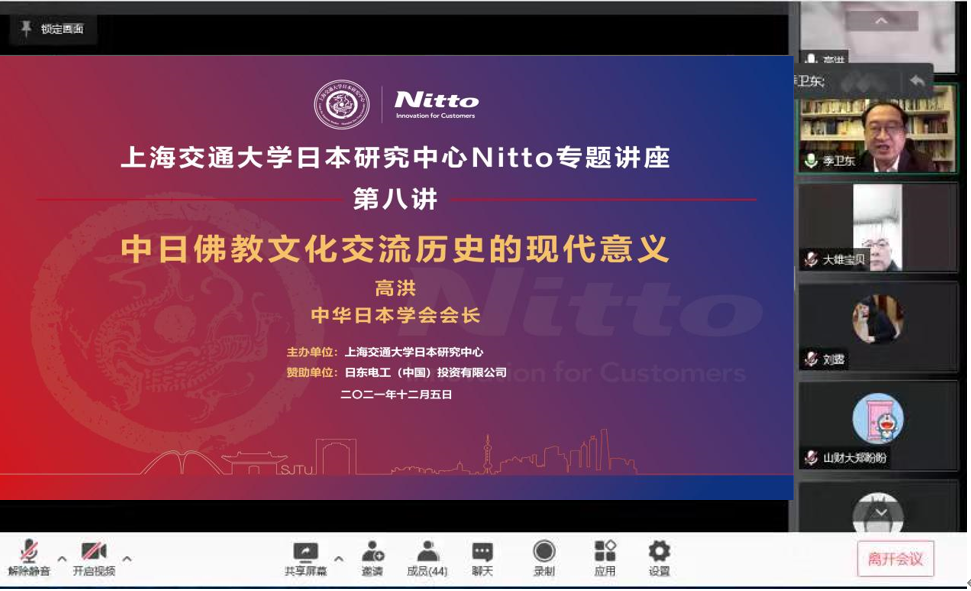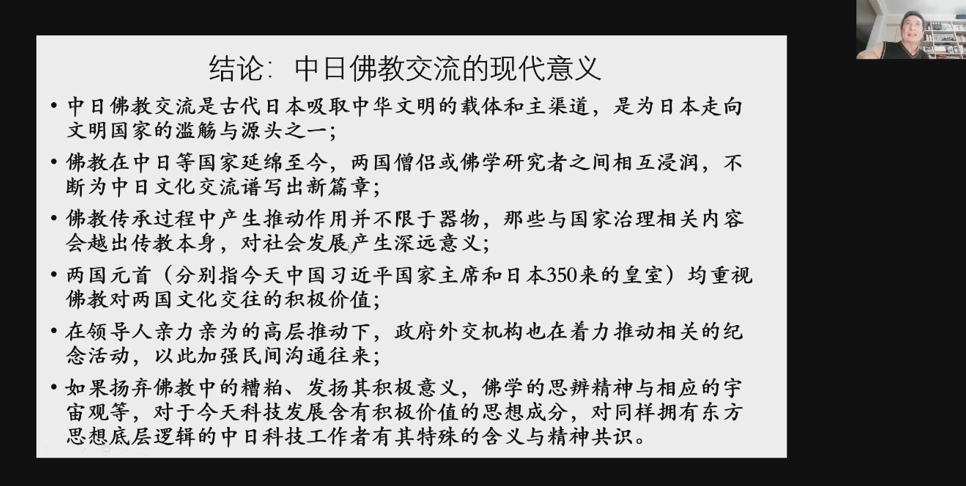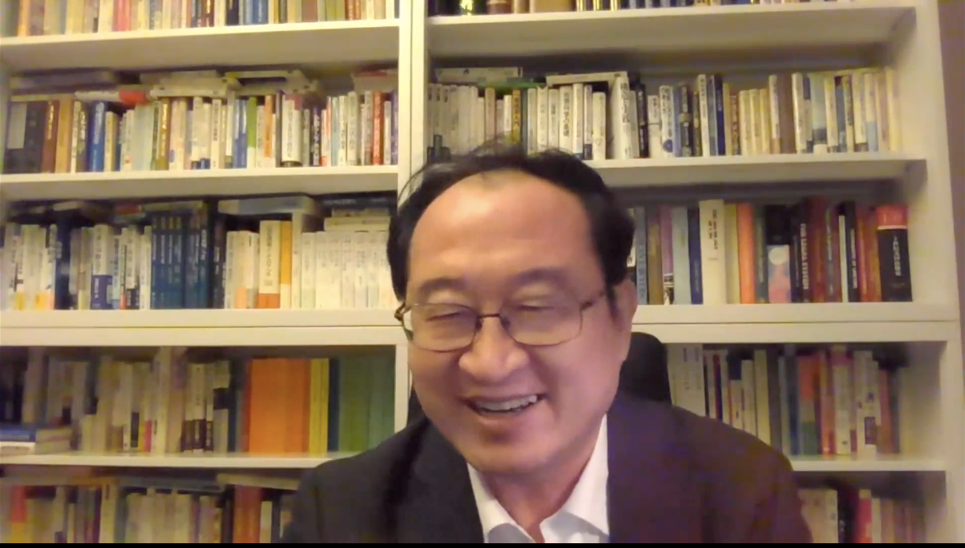On December 5, 2021, the eighth lecture of Nitto Special Lecture of Japan Research Center of Shanghai Jiaotong University was successfully held by live broadcast of Tencent Conference. The event was hosted by the Japan Research Center of Shanghai Jiaotong University and sponsored by Nitto Electric (China) Investment Co., Ltd. Gao Hong, President of the China Japan Society, was the keynote speaker of the lecture, with the theme of "Modern Significance of the History of Sino Japanese Buddhist Cultural Exchange". Ji Weidong, a senior professor of liberal arts at Shanghai Jiaotong University and director of Japan Research Center, and Great Wall Shengyi, a director of Nitto Electric (China) Investment Co., Ltd., delivered speeches on behalf of the sponsor and the sponsor respectively. The lecture attracted more than 50 Chinese and Japanese scholars, entrepreneurs and practitioners.

Gao Hong, President of the Japanese Society of China and the Research Institute of the Japanese Institute of the Chinese Academy of Social Sciences
On behalf of the Japan Research Center, Ji Weidong first expressed warm welcome and sincere thanks to the guests of this lecture, and gave a brief introduction to the keynote speakers. He said that Buddhist culture is of great significance in the history of Sino Japanese exchanges, and President Gao Hong is not only the president of the China Japan Society, but also a great scholar in China's research on Sino Japanese relations and the history of Sino Japanese relations. He believed that the lecture would certainly become a feast of knowledge.

Ji Weidong, Senior Professor of Liberal Arts of Shanghai Jiaotong University and Director of Japan Research Center, delivered a speech
Later, Chengshengyi delivered a speech. He first expressed his heartfelt thanks to the Japan Research Center of Shanghai Jiao Tong University for its efforts in organizing this online conference. At the same time, as the last lecture of Nitto special lecture in 2021, it is also a great honor to invite President Gao Hong to be the keynote speaker. Sino Japanese cultural exchanges have a long history, in which Buddhist cultural exchanges have an irreplaceable position and far-reaching influence. 2022 is the 50th anniversary of the normalization of China Japan diplomatic relations, and the Buddhist circles of China and Japan will also carry out various forms of cultural exchanges. Today, President Gao Hong discussed the significance of Sino Japanese cultural exchanges from the perspective of Buddhist scholarship, and I believe it will certainly give you all kinds of inspiration. I hope this meeting can provide a new perspective for the cultural exchanges between the Buddhist communities of the two countries next year. Next year, Nitto Electric will continue to work with the Japan Research Center of Shanghai Jiaotong University to promote further cooperation and exchanges between China and Japan in cultural, academic, industrial and other aspects through Nitto lectures, and make contributions to promoting the friendly development of China and Japan.

Great Wall Shengyi, Director of Nitto Electric (China) Investment Co., Ltd., delivers a speech
Then, the lecture entered the keynote speech segment. Gao Hong first expressed his thanks to all the guests and sponsors. With the theme of "the modern significance of the history of Sino Japanese Buddhist cultural exchanges", he analyzed the significance of Buddhism in Sino Japanese exchanges.
First of all, he proposed that the spread of characters was of great significance in Sino Japanese cultural exchanges, while the spread of Buddhism and the spread of ancient Chinese Buddhist scriptures to Japan were important media for the spread of Chinese characters, which proved the importance of Buddhist exchanges in the early communication between China and Japan.

Gao Hong, President of the China Japan Society, delivered a keynote speech
Later, he said that, in addition to Japanese monks studying abroad since the Sui and Tang Dynasties, Chinese Buddhist eminent monks, from Jianzhen in the Tang Dynasty to Yinyuan in the Ming Dynasty, had played an important role in Sino Japanese Buddhist studies and cultural and economic exchanges. At the invitation of Japanese officials, Monk Yinyuan crossed to Japan, presided over the Xingfu, Chongfu and Shejin temples in Nagasaki, and built the Huangbei Temple in Taihe Mountain in Kyoto, marking the establishment of the Huangbei Sect outside the Linji Sect and Cao Dong Sect in Japan. Later, the Huangbei Sect developed rapidly and gradually integrated into the Buddhist community and society. Yin Yuan and his disciples made many contributions to the promotion of cultural exchanges between China and Japan, especially to the promotion of the development of Japanese Zen Buddhism and the dissemination of Chinese calligraphy, painting, seal cutting, sculpture and other cultural and artistic achievements during the Ming and Qing dynasties, as well as various production technologies. Yin Yuan introduced the Ming Dynasty's concept of "letting the general public wisdom to ensure long-term social peace" to Japan, which is conducive to the improvement of the principle of order. Zen Master Yinyuan has been honored as a "master" for 6 times, and the ceremony of giving a new title is held every 50 years. The year 2022 is the 350th anniversary of the death of Zen Master Yinyuan. It is scheduled to hold the ceremony of awarding a number on April 3. The Japanese Huangbei Sect and the Buddhists and friends from all walks of life of China and Japan look forward to deepening folk exchanges and mutual understanding on the platform of Huangbei culture in the next year.

President Gao Hong introduced the important role of Zen Master Yinyuan in Sino Japanese Buddhist exchanges
At last, President Gao Hong summarized the modern significance of Sino Japanese Buddhist exchanges, and believed that Buddhism has continued in China, Japan and other countries, and monks or Buddhist researchers of the two countries have infiltrated each other, constantly writing a new chapter for Sino Japanese cultural exchanges. The impetus generated in the process of Buddhist inheritance is not limited to artifacts. Those related to national governance will go beyond preaching itself and have far-reaching significance for social development. At the same time, the Buddhist speculative spirit and outlook on the universe have a special meaning and spiritual consensus for the Chinese and Japanese scientific and technological researchers who today have the underlying logic of oriental thought.

President Gao Hong summed up the modern significance of Sino Japanese Buddhist exchanges
Professor Ji Weidong made a concluding speech on this special lecture. He pointed out that President Gao Hong had profound attainments in the study of the history of Buddhist exchanges. Next year marks the 50th anniversary of the normalization of diplomatic relations between China and Japan. We look forward to taking the opportunity of the 350th anniversary of the death of Zen Master Yinyuan to promote the "heart to heart" communication between China and Japan in Buddhism and other cultural exchanges. Finally, Professor Ji Weidong expressed his sincere thanks to President Gao Hong for the knowledge and ideas he brought to all the guests.

Professor Ji Weidong summarized the lecture